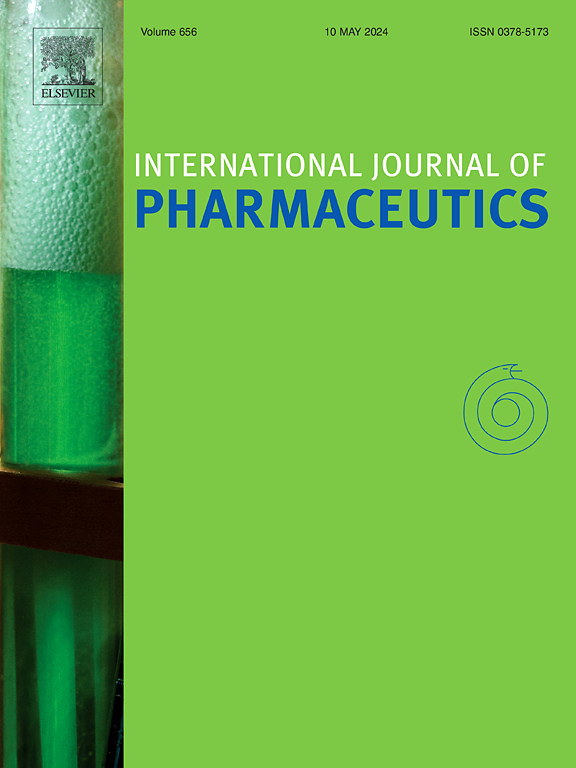Development and evaluation of a prostate-targeting wild chrysanthemum rectal heating gel for prostatitis treatment
IF 5.2
2区 医学
Q1 PHARMACOLOGY & PHARMACY
引用次数: 0
Abstract
This study aimed to develop a rectal heating gel for targeted treatment of prostatitis, on the basis of the synergistic effects of wild chrysanthemum (Chrysanthemu indicum) extract (rich in buddleoside and chlorogenic acid) and a phase-change microemulsion (PCME). A microemulsion system was developed with n-docosane serving as the thermal energy storage medium. The PCME was systematically characterized for particle size, stability, phase transition temperature, as well as heat-retention capacity. Results demonstrated good stability, with a phase transition temperature of 42.94–43.57 °C and latent heat of 98.43–100.41 J/g, capable of sustaining heat release for 30 min under simulated physiological conditions. Upon external heating, the PCME efficiently stored thermal energy; subsequently, following rectal administration, the incorporated system delivered prolonged and gentle thermotherapy at physiological temperature. Sodium carboxymethyl cellulose (CMC-Na) was selected as the mucoadhesive gel matrix to co-load the extract and PCME. Additionally, the optimized formulation contained 8.0 % extract, 75.5 % PCME, 1.2 % CMC-Na, and 15.3 % water. In vitro release studies indicated 69.21 % buddleoside and 93.73 % chlorogenic acid release over 12 h, with mucosal permeation rates of 69.92 % and 93.70 %, respectively. Animal studies revealed no notable irritation to the rectum or prostate, while significantly enhancing drug accumulation and peak concentration within prostatic tissue. Compared to conventional formulations, the heating gel more effectively decreased the prostate index and inhibited inflammatory cytokine expression, underscoring its synergistic efficacy in localized thermotherapy combined with targeted phytomedicine delivery. This innovative gel formulation is structurally stable, easy to administer, and dual-functional, representing a promising therapeutic candidate for the management of chronic prostatitis.

前列腺靶向野菊花直肠加热凝胶治疗前列腺炎的研制与评价
本研究旨在利用野菊花(chrysanthemum, chrysanthemum indicum)提取物(富含草皂苷和绿原酸)与相变微乳(PCME)的协同作用,开发一种靶向治疗前列腺炎的直肠加热凝胶。研制了一种以正十二烷为储热介质的微乳液体系。对PCME的粒径、稳定性、相变温度和保温性能进行了系统表征。结果表明,该材料具有良好的稳定性,相变温度为42.94 ~ 43.57℃,潜热为98.43 ~ 100.41 J/g,可在模拟生理条件下持续放热30 min。当外部加热时,PCME有效地储存热能;随后,在直肠给药后,结合系统在生理温度下提供长时间和温和的热疗法。选择羧甲基纤维素钠(CMC-Na)作为黏附凝胶基质,将提取物与PCME共载。此外,优化后的配方中提取物含量为8.0%,PCME含量为75.5%,CMC-Na含量为1.2%,水含量为15.3%。体外释药试验表明,12 h内草皂苷和绿原酸的释药率分别为69.21%和93.73%,粘膜通透率分别为69.92%和93.70%。动物实验显示对直肠或前列腺无明显刺激,但显著增强了前列腺组织内的药物积累和峰值浓度。与传统配方相比,加热凝胶更有效地降低前列腺指数,抑制炎症细胞因子的表达,强调了其在局部热疗结合靶向植物药物递送中的协同作用。这种创新的凝胶制剂结构稳定,易于管理,具有双重功能,是治疗慢性前列腺炎的有希望的治疗候选药物。
本文章由计算机程序翻译,如有差异,请以英文原文为准。
求助全文
约1分钟内获得全文
求助全文
来源期刊
CiteScore
10.70
自引率
8.60%
发文量
951
审稿时长
72 days
期刊介绍:
The International Journal of Pharmaceutics is the third most cited journal in the "Pharmacy & Pharmacology" category out of 366 journals, being the true home for pharmaceutical scientists concerned with the physical, chemical and biological properties of devices and delivery systems for drugs, vaccines and biologicals, including their design, manufacture and evaluation. This includes evaluation of the properties of drugs, excipients such as surfactants and polymers and novel materials. The journal has special sections on pharmaceutical nanotechnology and personalized medicines, and publishes research papers, reviews, commentaries and letters to the editor as well as special issues.

 求助内容:
求助内容: 应助结果提醒方式:
应助结果提醒方式:


